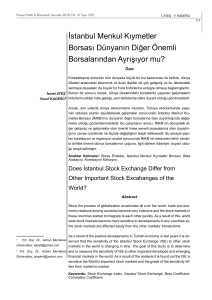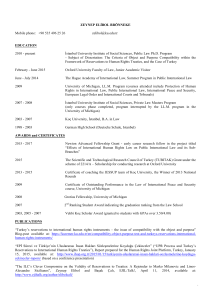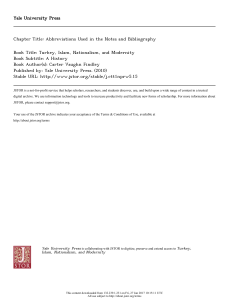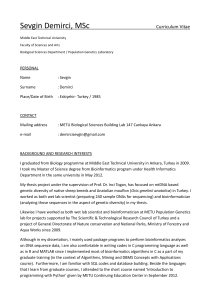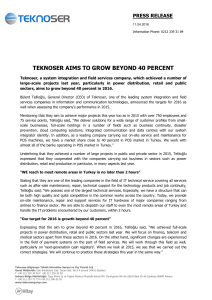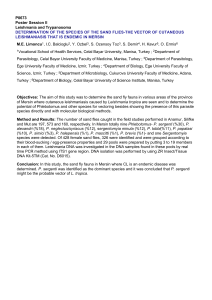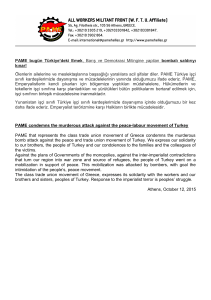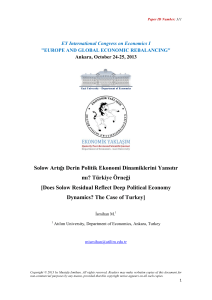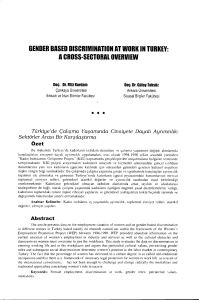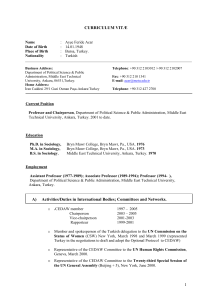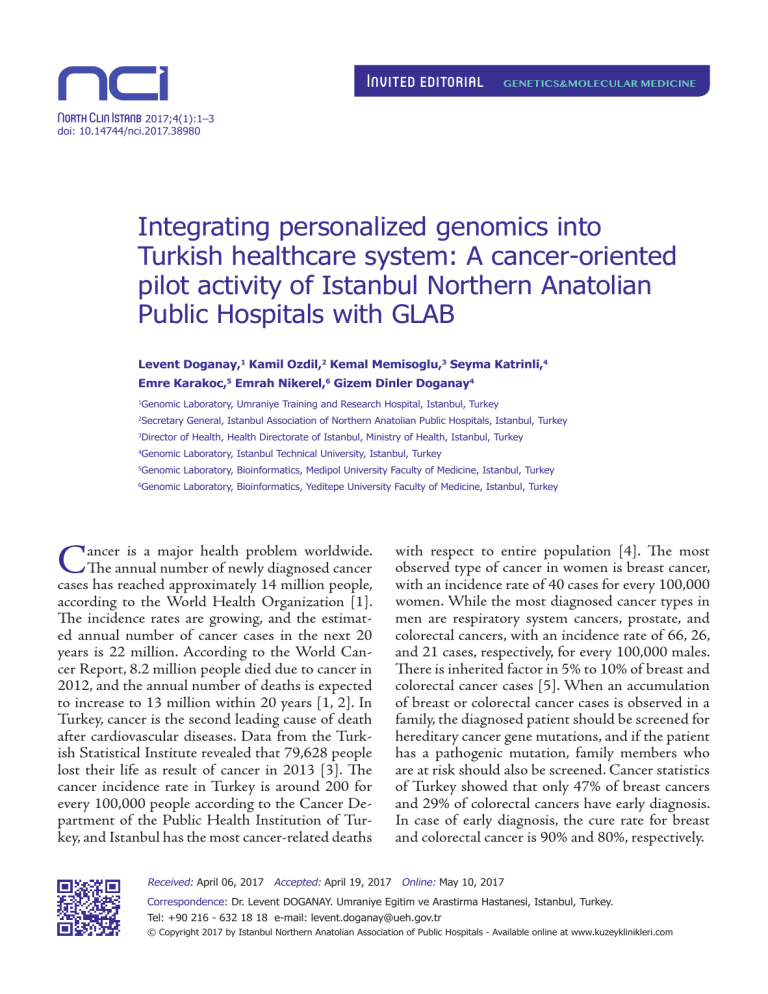
Invited editorial
GENETICS&MOLECULAR MEDICINE
North Clin Istanb 2017;4(1):1–3
doi: 10.14744/nci.2017.38980
Integrating personalized genomics into
Turkish healthcare system: A cancer-oriented
pilot activity of Istanbul Northern Anatolian
Public Hospitals with GLAB
Levent Doganay,1 Kamil Ozdil,2 Kemal Memisoglu,3 Seyma Katrinli,4
Emre Karakoc,5 Emrah Nikerel,6 Gizem Dinler Doganay4
Genomic Laboratory, Umraniye Training and Research Hospital, Istanbul, Turkey
1
Secretary General, Istanbul Association of Northern Anatolian Public Hospitals, Istanbul, Turkey
2
Director of Health, Health Directorate of Istanbul, Ministry of Health, Istanbul, Turkey
3
Genomic Laboratory, Istanbul Technical University, Istanbul, Turkey
4
Genomic Laboratory, Bioinformatics, Medipol University Faculty of Medicine, Istanbul, Turkey
5
Genomic Laboratory, Bioinformatics, Yeditepe University Faculty of Medicine, Istanbul, Turkey
6
C
ancer is a major health problem worldwide.
The annual number of newly diagnosed cancer
cases has reached approximately 14 million people,
according to the World Health Organization [1].
The incidence rates are growing, and the estimated annual number of cancer cases in the next 20
years is 22 million. According to the World Cancer Report, 8.2 million people died due to cancer in
2012, and the annual number of deaths is expected
to increase to 13 million within 20 years [1, 2]. In
Turkey, cancer is the second leading cause of death
after cardiovascular diseases. Data from the Turkish Statistical Institute revealed that 79,628 people
lost their life as result of cancer in 2013 [3]. The
cancer incidence rate in Turkey is around 200 for
every 100,000 people according to the Cancer Department of the Public Health Institution of Turkey, and Istanbul has the most cancer-related deaths
with respect to entire population [4]. The most
observed type of cancer in women is breast cancer,
with an incidence rate of 40 cases for every 100,000
women. While the most diagnosed cancer types in
men are respiratory system cancers, prostate, and
colorectal cancers, with an incidence rate of 66, 26,
and 21 cases, respectively, for every 100,000 males.
There is inherited factor in 5% to 10% of breast and
colorectal cancer cases [5]. When an accumulation
of breast or colorectal cancer cases is observed in a
family, the diagnosed patient should be screened for
hereditary cancer gene mutations, and if the patient
has a pathogenic mutation, family members who
are at risk should also be screened. Cancer statistics
of Turkey showed that only 47% of breast cancers
and 29% of colorectal cancers have early diagnosis.
In case of early diagnosis, the cure rate for breast
and colorectal cancer is 90% and 80%, respectively.
Received: April 06, 2017 Accepted: April 19, 2017 Online: May 10, 2017
Correspondence: Dr. Levent DOGANAY. Umraniye Egitim ve Arastirma Hastanesi, Istanbul, Turkey.
Tel: +90 216 - 632 18 18 e-mail: [email protected]
© Copyright 2017 by Istanbul Northern Anatolian Association of Public Hospitals - Available online at www.kuzeyklinikleri.com
North Clin Istanb
2
Hereditary cancers are generally caused by mutations in genes that are related to a high probability
of cancer development, vertical transmission from
parents, and an association with other tumor types
[6, 7]. Once an individual is suspected of carrying a
risk for hereditary cancer, genetic counseling should
be offered [8]. For example, in Istanbul, each year
6000 people are estimated to be diagnosed with
breast or colorectal cancer. As many as 10% of these
cancer patients, 600 cases, are expected to have a
genetic background of predisposition for cancer. If
these 600 patients have 3 siblings and 3 children,
that estimation reveals 3600 healthy individuals
that may have a cancer-predisposing mutation who
are at risk of developing cancer. The current developments in molecular genetics, and especially nextgeneration sequencing (NGS) technologies, allow
screening of multiple genes and multiple individuals
very quickly, which in turn, greatly supports preventive medicine.
To support this vital need for genomic screening
of hereditary breast and colorectal cancers, Genomic Laboratory (GLAB) was founded in Istanbul
under the constitution of the Istanbul Association
of Northern Anatolian Public Hospitals with the
cooperation of Istanbul Technical University with
a grant from the Istanbul Development Agency in
2015. The main objective of GLAB is to use NGS to
screen breast and colorectal cancer patients for hereditary cancer mutations, and if a patient has such a
mutation, the other family members are screened to
determine whether they have risk of developing hereditary cancer. Currently, the genes screened for are
BRCA1/2 (breast cancer 1/2), TP53 (tumor protein p53), PTEN (phosphatase and tensin homolog), ATM (ataxia-telangiectasia mutated), PALB2
(partner and localizer of BRCA2), CDH1 (cadherin 1), RAD51C/D (RAD51 homolog C/D),
BRIP1 (BRCA1-interacting protein 1), STK11
(serine/threonine kinase 11), and CHEK2 (checkpoint kinase 2). For colorectal cancer, MUTYH
(mutY DNA glycosylase), EPCAM (epithelial cell
adhesion molecule), MSH2/6 (DNA mismatch repair protein 2/6), MLH1 (MutL homolog 1, colon
cancer, nonpolyposis type 2), APC (adenomatous
polyposis coli), PMS2 (mismatch repair endonuclease PMS2), BMPR1A (bone morphogenetic protein receptor, type IA), PTEN (phosphatase and
tensin homolog), ATM (ataxia-telangiectasia mu-
tated), BLM (Bloom syndrome protein), TP53 (tumor protein p53), SMAD4 (SMAD family member n°4), STK11 (serine/threonine kinase 11), and
CHEK2 (checkpoint kinase 2). GLAB also gets
further support for bioinformatics analysis from
Yeditepe University and Medipol University.
Currently, GLAB provides service to patients
from Umraniye Teaching and Research Hospital and Goztepe Teaching and Research Hospital.
The blood samples of breast and colorectal cancer
patients are collected in these hospitals, and DNA
isolation from the samples is performed in the
GLAB laboratory located in Umraniye Teaching
and Research Hospital. Isolated DNA samples are
then transported to the GLAB laboratory located
in ITU, with appropriate care to maintain the cold
chain. Further NGS analysis is performed at this
GLAB site, and the data generated are analyzed
with bioinformatics tools. In this process, two different bioinformatics analysis pipelines are in use
to minimize false positive and false negative results.
Each observed variation is screened in multiple public databases for its phenotypic effect (i.e., whether
the variation is benign, pathogenic, or of uncertain
significance). In the end, a genetic report is created
based on the recommendations of a medical genetics doctor that includes the patient’s genetic screening result indicating that the mutation profiles are
uncertain significant, possibly pathogenic, or pathogenic variations, according to bioinformatics results.
If a patient has a pathogenic variation and a risk of
hereditary cancer, the patient may be offered a surgical option (prophylactic mastectomy, oophorectomy, colectomy etc.) in discussion with medical genetics doctor and surgical committee [8]. Moreover,
family members of this patient are offered genetic
screening and counseling. Umraniye Teaching and
Research Hospital, which specializes in oncological
genetic counseling, currently provides this service.
As a result, GLAB is creating the foundation for
preventive medicine in hereditary breast and colon
cancer in Turkey, and is integrating personalized
medicine into the Turkish health care system. The
services provided by GLAB will prevent and detect
cancer at early stages, thus reducing health care expenses and lowering cancer mortality rates.
Conflict of Interest: None declared.
Doganay et al., Personalized medicine for cancer
Financial Disclosure: The authors declared that this study
has received no financial support.
Authorship contributions: Concept – L.D., K.O., K.M., S.K.,
E.K., E.N., G.D.; Litearature search – L.D., S.K., E.K., E.N., G.D.;
Writing – L.D., S.K., G.D.; Critical review – L.D., K.O., K.M.,
S.K., E.K., E.N., GD.
REFERENCES
1. Forman D, Ferlay J. The Global and Regional Burden of Cancer.
In: Stewart BW, Wild CP, editors. World Cancer Report. Lyon:
IARCPress; 2014. p. 16–53.
2. GBD 2015 Mortality and Causes of Death Collaborators. Global, regional, and national life expectancy, all-cause mortality, and
cause-specific mortality for 249 causes of death, 1980-2015: a
systematic analysis for the Global Burden of Disease Study
2015. Lancet 2016;388:1459–544.
3
3. Türkiye İstatistik Kurumu. Ölüm İstatistikleri 2016. Available
at: http://www.tuik.gov.tr/PreHaberBultenleri.do?id=21526.
Accessed March 12, 2017.
4. Türkiye Halk Sağlığı Kurumu. Türkiye Kanser İstatistikleri 2017.
Available at: http://kanser.gov.tr/Dosya/2017Haberler/2014RAPOR._uzun.pdf. Accessed March 12, 2017.
5. Thomas DM, James PA, Ballinger ML. Clinical implications of
genomics for cancer risk genetics. Lancet Oncol 2015;16:e303–
8.
6. Lynch HT, Watson P, Conway TA, Lynch JF. Clinical/genetic
features in hereditary breast cancer. Breast Cancer Res Treat
1990;15:63–71.
7. Garber JE, Offit K. Hereditary cancer predisposition syndromes.
J Clin Oncol 2005;23:276–92.
8. Hartmann LC, Lindor NM. The role of risk-reducing surgery in hereditary breast and ovarian cancer. N Engl J Med
2016;374:454–68.


